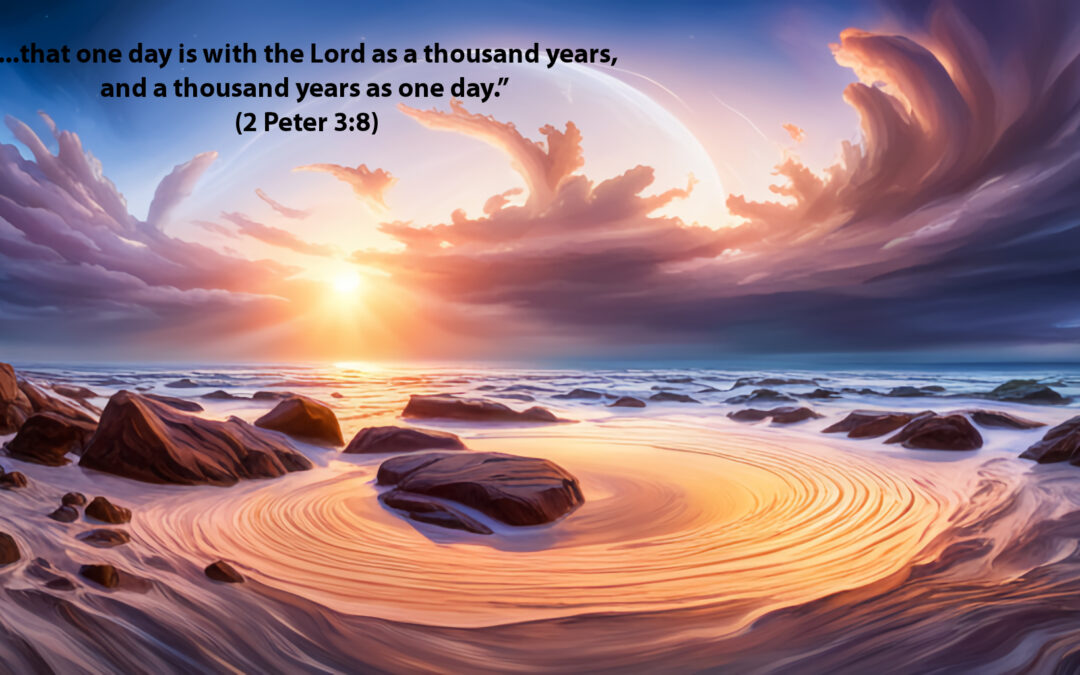“But, beloved, be not ignorant of this one thing, that one day is with the Lord as a thousand years,
and a thousand years as one day.”
(2 Peter 3:8)
In the prophet Isaiah’s inspired words, God is “the high and lofty One who inhabits eternity,” (57:15). And this is why, as our text indicates, time is irrelevant to him. This essential truth not only undergirds and supports the very foundations of our faith but it is an attribute of the Father that is most comforting to his people. Why? Because as Scripture says, “The eternal God is your refuge, and underneath are his everlasting arms,” (Deuteronomy 33:27), and “You have been our dwelling from generation to generation.” God is, always has been, and forever will be a place of refuge, safety, support, and habitation for his children.
As humans, we are limited in every way. We are bound by space and time. We have limited knowledge, understanding, and insight. We cannot see the future and we tend to forget the past. There are definitive limits to our strengths and abilities. In short, humanity is restricted in every way, from every measurable angle.
God, by comparison, is unrestricted; he is limitless. His existence extends backward eternally into the past and forward eternally into the future. There was never space nor time where or when God was not, and there will never be space nor time where and when he will not be. This is why when Moses asked, “Who will I say sent me?” God most appropriately responded… “tell them that I AM sent you.” I AM – God’s everlastingly present state of being.
These are concepts which we truly cannot grasp and can only barely imagine. But if God were finite like us, if he could be fully known and understood by us, he would be no God at all. For God, by definition, must be infinitely beyond our comprehension and imagination or he ceases to be God. He must be infinite (i.e., eternal) in every way, or he would not… could not… be God. “Thus says the Lord, the King of Israel, and his Redeemer, the Lord of hosts: ‘I am the First and I am the Last; besides Me there is no God,’” (Isaiah 44:6).
The eternality of God not only refers to the duration of his existence but this aspect of his being defines all his other qualities and attributes as well. That is to say, he is not only eternal as it relates to time and space, but to his knowledge, his abilities… in every way, from every angle, our God is a limitless God. His power is eternal (Rom. 1:20). His goodness is eternal (Rom. 9:5). His purposes are eternal (Eph. 3:11). His kingship is eternal (1 Tim. 1:17). His mercy and truth are described as “everlasting” and “enduring throughout all generations,” (Ps. 100:5).
Peter van Mastricht said, “The infinity of God [and therefore every aspect of his being] can be thought of either absolutely, with respect to his essence, as it is in itself, and this could be properly called and named the infinity of the divine essence. Or it can be thought of in relation or reference to his coexistence, either with other beings, whether they are spiritual or corporeal, or with the spaces in which beings exist or can exist, and in this way God’s infinity is called either omnipresence or immensity. Or it can be thought of in relation simply to his existence, that is, to his duration, which is eternity.”[1]
Reflecting once again on Isaiah’s words, God is the “high and lofty One who inhabits eternity,” let his people contemplate, celebrate, and be comforted by the reality that our forever God simply always is who he has been and will be, for he has no beginning, no end.
Contemplations:
- Your eternality rouses me to celebrate you, Lord, for you alone are infinite in your nature as well as in all your perfections – wisdom, goodness, righteousness – and not only are you so, but you will be so eternally, according to your name in Exodus 3:14, “I will be who I will be.” (Ps. 93:2; 102:12, 24, 26–27; 1 Chron. 16:36; 1 Tim. 1:17).
- Lord, you predestined your children to experience your eternal blessedness (1 Peter 1:4) by establishing your eternal covenant with us (2 Sam. 23:5; Ps. 111:9; Hos. 2:19).
- Help me acknowledge your everlasting, unchangeable nature with equally enduring gratitude, Lord. Let me praise you continually, for you alone are worthy of honor and glory “forever and ever,” (Ps. 119:106; 103:18; 139:24).
Further Scriptures for 2 Peter 3:8:
Psalm 90:4; Deut. 33:27; Job 36:26; 1 Tim. 1:17
[1] Petrus van Mastricht, Faith in the Triune God, ed. Joel R. Beeke, trans. Todd M. Rester and Michael T. Spangler, vol. 2, Theoretical-Practical Theology (Grand Rapids, MI: Reformation Heritage Books, 2019), 211–214.


